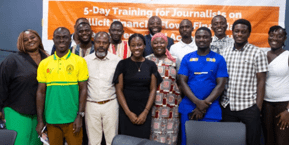By Christabel DANSO ABEAM
At the second edition of a one-week workshop on Illicit Financial Flows (IFFs) organised by the Media Foundation for West Africa (MFWA) and sponsored by the Thomson Reuters Foundation in Accra, veteran Zimbabwean journalist Cris Chinaka has emphasised that Africa’s political and economic security is being undermined by IFF activities.
He explained that IFFs weaken the rule of law, leaving nations ill-equipped to combat poverty. IFFs refer to the illegal movement of money or assets across borders, typically involving activities such as tax evasion, corruption, money laundering, bribery and the financing of criminal or terrorist enterprises.
According to the United Nations Conference on Trade and Development (UNCTAD), Africa loses approximately US$88.6billion annually due to IFFs, representing about 3.7 percent of the continent’s Gross Domestic Product (GDP). Similarly, the United Nations Economic Commission for Africa (UNECA) estimates that the continent loses around US$50billion each year to these illicit activities.
The Tax Justice Network Africa further reports that Ghana alone loses approximately US$1.4billion annually due to IFFs, primarily through tax evasion, tax exemptions and inefficiencies in the tax system.
“As journalists, it is our responsibility to dig deeper and uncover the truth, no matter how delicate it may be. This will encourage accountability and deter illicit financial activities,” said Cris Chinaka, an investigative journalist.
He highlighted that IFFs have become a major financial pitfall in Africa, providing an avenue for corruption. “Corruption fuels IFFs by reducing the effectiveness of legal mechanisms meant to curb illicit flows. It also helps offenders evade liability, protects those involved and undermines legal systems that should hold criminals accountable.”
According to him, the funds lost through IFFs significantly hinder Africa’s development, affecting critical sectors such as health, education, agriculture and mining.
He advocated the strengthening of capacities in various national institutions, including tax and customs authorities, financial intelligence units, central banks, law enforcement agencies and public prosecutors as a key solution to combating IFFs.
Additionally, he called for training and competence among journalists across the continent to generate greater interest and commitment in the fight against illicit financial activities.
The one-week workshop, themed ‘Expose the flow’, brought together ten journalists from Ghana and trained them on all aspects of IFFs. The objective was to equip them with the knowledge and skills necessary to investigate, report on and raise awareness about IFFs, thereby enhancing their ability to contribute to the fight against financial crime in their respective regions.
This initiative is part of a broader effort to curb the illicit movement of funds out of Ghana and Africa as a whole.
About MFWA
The MFWA is a regional, independent non-governmental organisation with a network of national partner organisations in all sixteen West African countries. It is dedicated to promoting and defending the right to freedom of expression, particularly for media professionals and human rights defenders in the region.
About Thomson Reuters Foundation
Formerly known as the Reuters Foundation, the Thomson Reuters Foundation was established in 1982 as an independent charity in the United Kingdom and the United States.
It leverages the power of journalism and legal expertise, combined with data intelligence, to raise global awareness of critical issues, inspire collective leadership and help shape the world.










